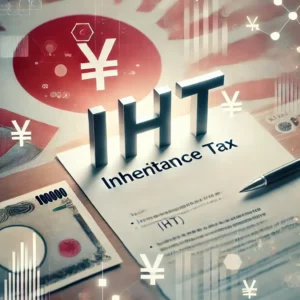Inheritance taxes are due in Japan for both foreigners and Japanese citizens, but the precise exclusions and obligations vary depending on residency, type of visa, and where inherited assets are located.
Knowing the rules is crucial for efficient estate planning, as expats who fulfill specific requirements may be eligible for Japan inheritance tax exemption. There might also be exemptions that could apply to assets from abroad.
The exception can greatly affect investment strategy and is especially pertinent for anyone thinking about how their assets will be handled when they pass away.
If you are looking to invest as an expat or high-net-worth individual, which is what I specialize in, you can email me (advice@adamfayed.com) or WhatsApp (+44-7393-450-837).
This includes if you are looking for alternatives or a second opinion.
Some of the facts might change from the time of writing, and nothing written here is formal tax advice.
For updated guidance, please contact me.
What is the inheritance tax exemption in Japan?
Inheritance tax exemptions in Japan include a discount of 30 million yen plus an extra 6 million yen for each legal heir, PwC said.
Accordingly, the total exempt amount rises in proportion to the number of actual heirs.
Heirs must file an IHT return and settle any taxes owed if the net value of the acquired estate is greater than the entire exemption maximum.
Should the valuation of the inherited assets top the exemption limit, Japan’s inheritance tax rates can range from 10% to 55%.

No tax is assessed and no filing is necessary if the estate is worth less than this amount.
Under the Table 1 visa, expats who have lived in Japan for fewer than 10 of the last 15 years are typically free from inheritance tax on assets held abroad.
This visa category in Japan permits foreign nationals to temporarily reside there, primarily for work-related reasons.
Similar to how Japanese nationals are treated, Japan has the authority to levy foreigners’ international assets upon succession once they have lived in the country for at least 10 years.
How does the Japan inheritance tax exemption differ for expats vs Japanese nationals?
IHT exemption rules for expats in Japan can be more intricate.
Only assets held in Japan are subject to inheritance tax for foreign citizens holding a Table 1 visa who satisfy the requirements for temporary residency. But if this time is exceeded or if you have a Table 2 visa, you will be subject to taxation of global inheritance that’s akin to the responsibilities faced by Japanese citizens.
If the beneficiary is a non-Japanese national overseas or a temporary foreigner in Japan, transfers from foreign nationals with Table 1 visas are excluded from IHT on overseas wealth. How long they stayed in Japan wouldn’t be factored in.
Inheritance tax is always applied on transfers of assets that are within Japan, whatever the status of the parties.
Previously, the government has reportedly loosened several restrictions for foreigners, like the so-called 5-year tail rule, which formerly mandated that foreigners who had lived in Japan for more than 10 years pay taxes on their foreign inheritances within five years of departing.
Japan Inheritance Tax Exemption Changes 2024
There have been major revisions to Japan’s inheritance tax exemption that took effect on January 1, 2024.
The most significant change is the increase to seven years from three years in the look-back timeframe for calculating how much a decedent’s estate is worth when incorporating gifts.
This implies that the taxable estate will take into account any gifts given within seven years of the decedent’s passing.
Gifts given between four and seven years prior to death will be eligible for a new 1 million year discount to offset the effect of the new rule.

Up to 25 million yen can be given tax-free to children or grandchildren by parents or grandparents under the early-inheritance system; these gifts become part of the donor’s estate upon death.
People who use this system can additionally give up to 1.1 million yen in tax-free gifts annually without having to file a gift tax return. These contributions won’t be included in the decedent’s estate value.
These adjustments are intended to improve adherence to inheritance tax laws while offering more advantageous circumstances for taxpayers. They are a reflection of Japan’s continuous attempts to modify its tax system to accommodate changing demographics and economic demands.
This comes as the government looks to fill labor shortages and draw in highly qualified expats.
How to claim inheritance tax exemptions in Japan
Finding out your resident status is crucial to becoming eligible for the exemption.
Within 10 months following the decedent’s passing, heirs must submit an IHT return if the net worth of the inherited estate is greater than the exemption amount. A thorough description of all acquired assets and their values ought to be included in the return.
Make an accurate appraisal of any inherited assets, such as stocks, bank accounts, real estate, and personal belongings. To guarantee correct reporting, the value needs to adhere to Japanese tax laws.
Accurately assess all inherited assets, including real estate and stocks. The valuation must comply with Japanese tax regulations to ensure proper reporting.
Compile the required paperwork to back up your exemption claim, such as any pertinent financial accounts and evidence of your kinship with the deceased (such as family register records).
It is necessary to seek advice from a tax advisor or legal expert who is knowledgeable about both Japanese and global tax laws to efficiently manage the complicated Japan inheritance tax exemption rules.
Pained by financial indecision?

Adam is an internationally recognised author on financial matters with over 830million answer views on Quora, a widely sold book on Amazon, and a contributor on Forbes.



